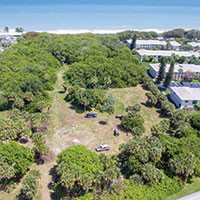 Neighbors of Shores A1A parcel want it turned into park
Neighbors of Shores A1A parcel want it turned into park
STORY
Residents who live near a 5.5-acre parcel near the ocean that the Town of Indian River Shores is considering rezoning for development want the land turned into a park instead.
Shores Planning Zoning and Variance Board alternate Judy Orcutt presented a proposal last week to preserve what she called the Town’s “hidden gem” for public enjoyment instead of selling the property, which has an appraised value of $7.7 million, for condominiums or townhouses.
Orcutt, an environmental activist and major supporter of efforts to deal with lagoon issues and set aside conservation lands, told the PZV Board members that the Shores has no parks, and that she thinks the Town needs the green space more than it needs the tax dollars that would flow in from selling the land for development.
“There may never be another opportunity like this one to preserve open space for future generations,” Orcutt said in her proposal. “The Town doesn’t own any other land that is suitable for a park. A park’s natural features and open environment would help define the Town’s image and distinctive character.”
She said wildlife on the property, including protected gopher tortoises, would be displaced should the land be developed for townhomes or condos. In addition, Orcutt said, developing the property would increase traffic on A1A.
Members of the Pebble Bay Homeowners Association are also concerned about the future of the property that abuts their community; they fear the loss of beach access they’ve historically enjoyed – passing across the parcel to reach a strip of county-owned land on the ocean – if the property is developed and perhaps walled or gated off.
Despite concerns, the Planning Zoning and Variance Board recommended rezoning the property for development. The Shores Town Council is next set to meet at 9 a.m. on May 25. The agenda is not yet available but the re-zoning item is expected to be on it.
Meanwhile Orcutt and her neighbors are in the process of retaining barrier island attorney Michael O’Haire – who has also been working on resident concerns related to the cell phone tower controversy – to look into supposed deed restrictions on the property that might make it ineligible for development, and aid the cause of setting it aside for a public use like recreation.
The property was reportedly donated to Indian River County decades ago and then turned over to the Shores in the 1970s as part of a land swap deal for some property on A1A. What covenants or restrictions might have transferred with the deed is unknown.
Should the land be retained for recreation, the Town would lose any opportunity to tax it, plus residents would assume the cost of developing and maintaining the park.
If the property is sold, the cash infusion could be used to bolster reserves or to pay down the Town’s unfunded pension or other post-employment benefit liabilities, or a combination of both. A portion of the proceeds could be used to fund the Shores’ ongoing battle with Vero electric.
Theoretically the windfall could also be used to reduce property taxes for a year or a number of years, should the Town Council choose that route. Each year, the Town raises about $4 million in property taxes from its tax rate of $1.67 per $1,000 in taxable value, roughly 90 percent of which goes to fund public safety services.
County Administrator Joe Baird told Town officials he would work with staff to create some sort of license agreement permitting a purchaser of the parcel to have beach access, either by a beach path or some sort of dune crossover, which would add to the value of the property.
If sold and on the tax rolls, the County and the School Board, as well as the Town, would enjoy new tax revenue from the property, with tax revenue increasing further as homes are built there. An R1-A residential zoning with low-density or LD land use designation would provide for a maximum of three units per acre, Stabe said; R2-A residential zoning with medium-density or MD land-use designation would allow up to six units per acre, meaning as many as 20-30 units could be built on the property, creating millions of dollars’ worth of additional real estate value.
Once all of the annexation and updated zoning work is completed, and the land use is incorporated into the Town’s comprehensive plan to ensure the buyer has no issues down the road in trying to develop the property, the Shores can find someone to market the land. Appraisers estimated it might take a year to find the right buyer, but Pebble Bay homeowners believe the Town already has a developer waiting in the wings.








